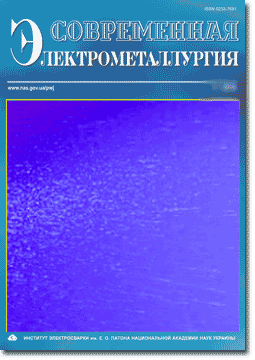| 2007 №04 | 2008 №02 |

CONTENTS

ELECTROSLAG TECHNOLOGY
Tsykulenko K.A. Physical modeling of slag pool hydrodynamics in slab current-carrying mould. Part1. Ingot melting 2
Investigations of hydrodynamics of slag pool in slab current-carrying mould were carried out. Assessment of effect of different schemes of connection of electrodes of a current-carrying section on nature of hydrodynamic flows was made by changing current value in the electrodeДbottom plate circuit, distance from the bottom plate to the current-carrying section and depth of immersion of the electrodes. Qualitative pattern of distribution of hydrodynamic flows in the slag pool of the slab current-carrying mould was obtained. Results of the investigations will be used in designing of these moulds and determination of dimensions of the intermediate section and current-carrying areas.
ELECTRON BEAM PROCESSES
Ustinov A.I., Lyapina K.V., Melnichenko T.V. and Nekrasov A.A. Influence of substrate temperature on formation of porous structure of stainless steel in case of its joint deposition with NaCl and KCl vapors 8
Porous condensates were produced in joint deposition on a substrate of vapor flows formed by electron beam evaporation in vacuum of the Kh18N10T steel and halogenides of alkaline metals (chloral sodium and chloral potassium). Influence of the substrate temperature on regularities of the porous structure formation of the stainless steel condensate was studied. It was shown that porous structure of open type formed most intensively at such values of the substrate temperature, when boundaries of columnar crystallites loosed their stability.
Severin A.Yu., Trigub N.P. and Zhuk G.V. Electron beam cold hearth remelting of high-temperature titanium alloys hardened by silicides 12
Technology of electron beam melting of titanium alloys with increased content of silicon is presented. Influence of weight share of elements in the initial charge on their content in ingots is studied, distribution of hardness and microstructure of produced ingots are investigated. A new method for layer-by-layer solidification of ingots, which allows improving their quality, is suggested.
Savenko V.A., Grechanyuk N.I. and Churakov O.V. Electron beam refining in production of platinum and platinum-base alloys. Information 1. Electron beam refining of platinum 14
Commercial technology for production of platinum in ingots with content of the base element not less than 99.99 % was developed.
PLASMA-ARC TECHNOLOGY
Zhdanovsky A.A., Shapovalov V.A., Melnik G.A., Zhirov D.M., Prikhodko M.S. and Odintsova L.G. Investigation of plasma-slag processes in special and ladle electrometallurgy of steel 17
Theoretical analysis made it possible to consider advantages of the progressive technology of steelmaking and determine specificity of main processes of the plasma-slag metallurgy, calculate partial pressure of the components and composition of the vapor-gaseous phase above slag of the fluoriteДlime and limeДaluminaДsilicate systems. Experimental investigations allowed specifying some peculiarities of pyrometallurgical reactions in the gas (plasma)ДslagДmetal system in melting of ball bearing and stainless steels, low carbon iron, high carbon ferrochromium, and alloying of iron by chromium in case of application of the plasma-arc models as heat sources.
GENERAL PROBLEMS OF METALLURGY
Kurenkova V.V., Onoprienko E.V., Malashenko I.S., Belyavin A.F. and Chervyakova L.V. Structure and strength properties of brazed joints of JS26NK cast nickel alloy. Part 2 24
Materials science problems of formation of brazed joints in the JS26NK cast nickel alloy are considered. Physical-chemical properties of brazed joints, produced with application of standard boron-containing brazing alloy and brazing alloy containing silicon as second depressant, and different binders are presented. It is shown that application of a binder in the form of solution of acrylic acid in acetone is efficient in case of application of complex brazing alloys containing 20 % of the NiД12 % Si (NS12) commercial brazing alloy powder. Achieved at room temperature strength and fracture toughness of a brazed joint from the JS26NK alloy exceed similar characteristics of the JS26VI alloy. Connection of mechanical properties of brazed joints with direction of dendrite growth in the metal being brazed is shown.
Rabinovich A.V., Bublikov Yu.A., Tregubenko G.N., Polyakov G.A., Puchikov A.V. and Dementieva Zh.A. Improvement of structure and properties of cast ferrite-pearlite steels for transport machine building 33
Technology for complex modification of casting from low-alloy ferrite-pearlite steels by titanium, aluminium and nitrogen was developed, which ensures increase of the lower level of yield strength in normalized (У 380 MPa) and temper hardened (У 450 MPa) state, the rest requirements to mechanical properties of the 20GL steel being preserved.
Postizhenko V.K. Analysis of technological development of finish metal product treatment 37
Review of existing in the world methods of the rolled metal heat treatment and technological directions of coating application on metal products is made. Results of technological development analysis of finish metal product treatment are presented. The most rational technological schemes of finish metal product treatment are suggested.
ELECTROMETALLURGY OF STEEL AND FERROALLOYS
Kostyakov V.N., Poletaev E.B., Grigorenko G.M., Medved S.N., Shevchuk E.A., Yasinsky A.A. and Yakovishin O.A. Heat exchange in molten pool in liquid-phase melting of ore-coal pellets 43
Results of the heat exchange investigation in a pool in liquid-phase melting of the ore-coal pellets are presented. Dependence of heat-transfer coefficient from the slag to a pellet upon intensity of the slag mixing in the furnace pool is established.
INFORMATION
To 80th anniversary of academician Boris A. Movchan 48
Developed at PWI 7
(You are viewing the simplified file contents)
The cost of subscription/purchase order journals or individual articles
| Journal/Currency | Annual Set | 1 issue printed |
1 issue |
one article |
| TPWJ/USD | 384 $ | 32 $ | 26 $ | 13 $ |
| TPWJ/EUR | 348 € | 29 € | 24 € | 12 € |
| TPWJ/UAH | 7200 UAH | 600 UAH | 600 UAH | 280 UAH |
| AS/UAH | 1800 UAH | 300 UAH | 300 UAH | 150 UAH |
| AS/USD | 192 $ | 32 $ | 26 $ | 13 $ |
| AS/EUR | 180 € | 30 € | 25 € | 12 € |
| SEM/UAH | 1200 UAH | 300 UAH | 300 UAH | 150 UAH |
| SEM/USD | 128 $ | 32 $ | 26 $ | 13 $ |
| SEM/EUR | 120 € | 30 € | 25 € | 12 € |
| TDNK/UAH | 1200 UAH | 300 UAH | 300 UAH | 150 UAH |
| TDNK/USD | 128 $ | 32 $ | 26 $ | 13 $ |
| TDNK/EUR | 120 € | 30 € | 25 € | 15 € |
AS = «Automatic Welding» - 6 issues per year;
TPWJ = «PATON WELDING JOURNAL» - 12 issues per year;
SEM = «Electrometallurgy Today» - 4 issues per year;
TDNK = «Technical Diagnostics and Non-Destructive Testing» - 4 issues per year.




